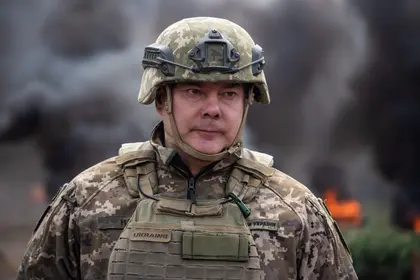If Russia continues to increase weapons production and improve technologically with the help of its allies, the war could spread beyond the eastern and southern areas, Lieutenant General Serhii Nayev, who has responsibility for Ukraine's Northern border defense, said speaking in an interview with ABC News.
“We are getting ready for that,” he said. “We're building defenses, laying landmines, and training our forces.”
JOIN US ON TELEGRAM
Follow our coverage of the war on the @Kyivpost_official.
Despite Ukraine's initial successes in preventing total Russian occupation, the counteroffensive that was launched five months ago has yielded minimal gains. This inertia underscores a noticeable shift in the nature of the war.
The Lieutenant General bluntly acknowledged that the ongoing war has now essentially become a resource-driven war.
Nayev pointed out that Russia secures its resources through alliances with what he referred to as the “Axis of Evil,” which includes North Korea and Iran.
In contrast, Ukraine relies on voluntary support from its international partners and that any decrease in Western aid will negatively impact the situation on the frontline.
“It must be understood that the reduction of aid will really hit our defense capabilities. But we will fight with what we have,” he added.
Nayev pointed out that the focus in this war has shifted from one of purely quantity to one of strategic preparedness.

‘I Only Know South Korea Has Fewer Mountains’ – Testimony From Captured Pyongyang POW
“Technology is critical. Where, according to the old Soviet-style technologies, it was necessary to expend 100 shells, now with Western [munition] technologies, much less is needed, we now measure in numbers of ten or less - the technology always outweighs the numbers,” Nayev said.
“And I will emphasize once again that this help is very, very important to us,” he concluded.
Since the onset of Russia's full-scale invasion, Moscow has secured assistance from Iran for the supply of Shahed kamikaze drones. Russia regularly deploys these UAVs to attack both military and civilian infrastructure in Ukraine.
Iran, in turn, has participated in constructing a plant in Russia for Shahed production, scheduled for completion by the end of next year. Russia aims to manufacture 6,000 drones annually by 2025 with Iran's support.
As for North Korea, recent bilateral talks have resulted in the securing of an expanded cooperation agreement between the two countries.
In particular, North Korea has shipped over 1 million artillery shells to Russia, since August of this year.
You can also highlight the text and press Ctrl + Enter










